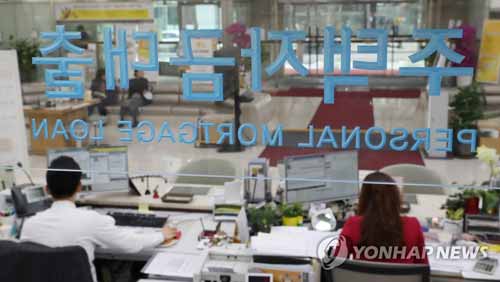Loan restriction in the case of excessive annual income over 100%… Low income earning people to get loan barely
Cho Eun Guk | ceg4204@ | 2018-03-26 11:00:04

By Yonhab News
Citizens with low incomes are likely to be more difficult to cross the bank. The interest rate on lending has soared as the Federal Reserve raised interest rates and the household loan market is expected to shrink sharply as the DSR.
According to the financial sector on March 25, the total debt-to-equity ratio (DSR) will be implemented on March 26, starting with major commercial banks.
DSR is a method to determine the ceiling of loans compared to the annual income by adding annual principal repayments of all loans, not just existing mortgages but also credit loans. If the DSR is 100%, that is, if the total liability redemption is equal to or exceeding the annual income, the bank will consider the high DSR loan and restrict the loan limit and manage it separately.
The banking system`s DSR operation pattern is similar in the big frame, but it shows in detail each bank. Therefore, borrowers should carefully look at their existing loan amount, their credit rating and income, and choose a favorable bank.
Once the DSR exceeds 100% for both credit and secured loans, KB Kookmin Bank classifies it as high DSR. If the loan exceeds 150% and the mortgage exceeds 200%, the loan is rejected. Kookmin Bank also classifies high DSR targets as high-risk credit groups and conducts management and quarterly monitoring.
Meanwhile, Woori Bank operates differently depending on its credit rating even if it is a high DSR with 100% or more. In the case of credit lending, the high DSR is handled when the credit rating is 1 to 3, and if the DSR is less than 4, if the DSR is not less than 100 and less than 150%, the headquarters will review the loan. However, if the DSR exceeds 150%, it is automatically rejected. Mortgage loans can be extended to loans with grades 1 to 6 and below 7 grades will be reviewed by the headquarters to determine the availability and limit of loans.
The NACF also classifies the mortgage loan and the credit loan as high DSR if the DSR exceeds 100%, and strengthens the follow-up management through continuous monitoring. If mortgage loans are 150% DSR and 100% loans, the loan will be checked through the headquarters.
KEB Hana Bank will also apply the DSR 100% as a base, and will review the credit rating and collateral for borrowers exceeding the standard.
Thus, borrowers with higher DSRs with lower income levels are more difficult to receive additional loans as the major banks limit the lending limits based on DSR. "Financial consumers with high income levels are not subject to any particular restrictions as DSR is entirely classified as income," an expert at a banking office said. "On the other hand, people with lower income levels are more likely to receive loans."
With the recent tightening of high-intensity loans, the interest rate on lending, which has climbed steeply, has become a heavy burden for ordinary people. Domestic interest rates, which reflect domestic and international policy rates, have risen sharply as the US Federal Reserve raised interest rates three times in the past three years after raising interest rates three months ago. In particular, the Federal Reserve is expected to raise interest rates three times this year, and the Bank of Korea is also expected to raise interest rates one or two times this year.
Also, the interest rates on mortgage loans that have already been covered by major domestic banks over the past 10 years have risen by a maximum of 0.12 % points over the past three months, and some banks have exceeded the maximum interest rate by more than 5 %. Once this trend continues, the central bank`s maximum interest rate will reach 6% by the end of the year.
In this method, it becomes more and more difficult for the people with lower income and credit ratings to receive loans, as the government tightens the loans and raises interest rates. Delinquency risks are expected to grow further, especially for marginal borrowers as delinquency rates continue to rise.
"The implementation of DSR and interest rate hikes will have a profound impact on the elderly and other vulnerable groups," a bank expert said.
By Cho Eun Guk ceg4204@
